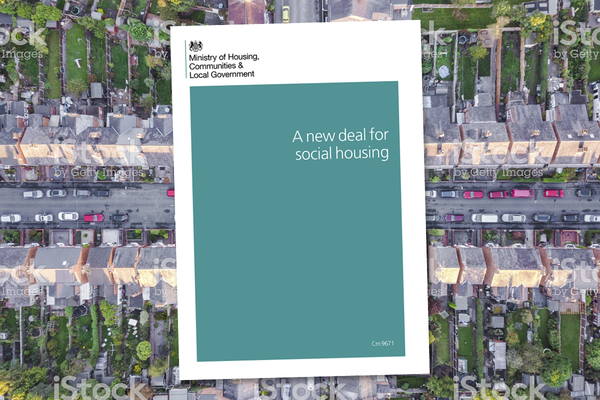You are viewing 1 of your 1 free articles
Green paper shows ministers now see associations as trusted partners
Focusing on the failure of the green paper to address supply misses the point, writes Boris Worrall
Tribalism is central to British politics.
Little has changed since the days of The Iron Lady famously asking if people were ‘one of us’. It was and probably will always be so.
The over-arching story which the government constructs and then seeks to control is also critical.
Policy is of course important - but if it doesn’t fit the narrative or work from a trusted partner perspective, it’s unlikely to fly.
So accepting that the Social Housing Green Paper had little new to say on supply, is there anything of substance left?
“We are hearing the government replay back to us what we have been saying for years.”
Actually, a great deal. Housing associations are absolutely central to government policy, and the story it is constructing about what it stands for and is here to do. That is remarkable.
The publication of the Green Paper marks the culmination of a sustained and successful strategy to re-boot the relationship with the government.
It was launched the same week as the Voluntary Right to Buy Pilot, the very thing which marked the moment housing stepped back from the brink of existential disaster and began the long journey to where we are today.
At that time, this was a sector under siege from a Prime Minister and his Chancellor. The Green Paper opens with a Prime Minister talking about how housing associations manage a fifth of all homes which ‘helps to keep neighbourhoods diverse and integrated’ and a Secretary of State describing social housing as ‘safety net and springboard’ in a country where “Everyone deserves a decent, affordable ad secure place to live”.
This is a seismic shift in how Government thinks about and articulates what social housing is there to do.
James Brokenshire MP twice talks about social housing as the “first social service” and adds: “We have heard what people love about social housing – stories of people’s pride in their homes and communities”.
The content, tone and focus of this document could have been written by a housing association chief executive.
Today we are hearing the government replay back to us what we have been saying for years.
“The content, tone and focus of this document could have been written by a housing association chief executive”
The central narrative the government is constructing in this logical and well-thought out document is one we can not only recognise, but for the most part endorse and even embrace.
In tacking the terrible events of Grenfell, it would have been easy for the government to set its sights on our sector; but today we are partners to be trusted – not enemies to be undermined.
So what does that mean for us? The Green Paper itself is a logical, sensible and appropriate response to a terrible tragedy and sets out some significant challenges and questions we should embrace openly and enthusiastically
There will be changes to consumer regulation, complaints and how we are measured in performance against our peers.
We may even see a move to the kind of financial ‘penalty and reward’ regulation of the rail and energy industries.
There’s also the rolling back of previous policies, such as the ill-thought-out sale of high value assets.
So focusing on the failure of the paper to address supply in any significant sense really misses the point.
That was never the point of something born in such tragic circumstances.
Let’s instead recognised that right now we are as aligned to government thinking and focus as we have ever been in recent years, and acknowledge that it’s far, far better to be in the tent rather than shivering outside.
Because there’s a housing crisis out there. And make no mistake, government needs us to help solve it and genuinely wants us to succeed. So let’s crack on.
Boris Worrall, chief executive, Rooftop Housing Group
Social Housing Green Paper: full coverage
All our Social Housing Green Paper coverage in one place:
Green paper measures are not enough to create May’s ‘new generation’ of council homes Green paper proposals are welcome but much more is needed to support councils to build, writes John Bibby
Green paper shows ministers now see associations as trusted partners Focusing on the failure of the green paper to address supply misses the point, writes Boris Worrall
Government should focus on building on what is already strong Philippa Jones considers the Social Housing Green Paper through a slightly different lens
We need more than a week of delayed announcements bundled together Jules Birch reflects on the government’s ‘Housing Week’ announcements
The regulator should monitor how associations assist homeless people Government announcements this week are positive, but any enhanced role for the English regulator should include looking at homelessness prevention work, argues David Bogle
The regulator’s role should be limited to dealing with systemic failures Julian Ashby suggests the Housing Ombudsman Service should deal with all complaints
The green paper shows ministers are in listening mode Despite some glaring omissions, the government appears to be in listening mode and it is important the sector takes advantage, argues Emma Maier
A short history of social housing league tables Attempts to create league tables for housing associations are nothing new. Mervyn Jones looks at how they have worked in the past
League tables could prove blunt and counter-productive, sector warns Housing figures criticise government proposals to measure social landlords against performance indicators
Government ‘must decide how proactive regulator should be’ on consumer standards Ministers now face a dilemma over the regulator’s focus, sector figures say
The Green Paper: a golden opportunity missed? Melanie Rees assesses the Social Housing Green Paper against recommendations drawn up by the Chartered Institute of Housing and finds the government comes up short
Longer strategic partnerships and guranteed debt to boost social housebuilding The Social Housing Green Paper outlines key ways of boosting supply
The green paper is remarkable progress but it is still not enough The green paper suggests the government appears to be re-writing much of its policy since 2010, but more needs to be done, writes Jules Birch
Green paper marks a ‘milestone’ on resident involvement The government’s recognition residents need clear information is to be welcomed, now it up to the sector to embrace tenant involvement, writes Paul Hackett
Ministers consider stock transfer programme to community-led associations The stock transfer programme could be revived under proposals in the housing green paper
Access to housing grant could be tied to new league tables Grant could be awarded according to how well landlords meet performance indicators, the paper suggests
Ofsted-style regulation of tenant services proposed The government is considering expanding the Regulator for Social Housing’s remit to intervene over tenant services and give it a more “proactive approach to enforcement”
Government proposes dropping one-for-one Right to Buy replacement commitment A consultation paper published alongside the green paper proposes a broader measurement to replace the one-for-one pledge
A list of recent housing policy U-turns The green paper confirms yet more housing policy U-turns from the government, which has spent the past two years dropping policy ideas developed under the David Cameron government. Here is a rundown of the major changes in policy direction
Sector welcomes green paper but calls for more ‘ambitious investment’ Reaction to the proposals, from the National Housing Federation, Chartered Institute of Housing and more
Morning Briefing: reaction to green paper announcements how the media reported the proposals trailed by the government overnight
Government drops plans to force councils to sell higher-value stock The government drops plans to force councils to sell higher value homes
League tables and ‘sharper teeth’ for regulator in social housing green paper Ministers reveal some of the things in the paper ahead of its publication
Grenfell survivors: green paper does not go far enough survivors of the Grenfell Tower fire have said the measures published in the Social Housing Green Paper do not do enough to rectify issues in the social housing sector
KEY PROPOSALS IN THE SOCIAL HOUSING GREEN PAPER
- New 'league tables' of housing providers based on key performance indicators, surrounding services such as repairs and neighbourhood management. This could be linked to housing grant.
- Consideration to scrapping of the current 'serious detriment' test, to allow 'Ofsted-style' tougher consumer regulation
- New home ownership options such as allowing tenants to buy as little as 1% of their property each year through shared ownership. This would only apply to new shared ownership purchases.
- Ditching of plans to force social landlords to offer fixed term tenancies rather than lifetime tenancies in social housing
- Ditching of plans to force councils to sell off their most valuable social housing when it becomes vacant
- The potential introduction a new stock transfer programme from councils to 'community-led' housing associations
- The return of guaranteed debt funding to help the development of affordable homes, and longer term 'strategic partnerships' for developing housing associations













